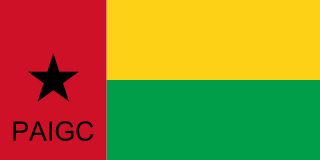 W
WThe Portuguese Colonial War, also known in Portugal as the Overseas War or in the former colonies as the War of Liberation, and also known as the Angolan, Guinea-Bissau and Mozambican War of Independence, was a thirteen year long conflict fought between Portugal's military and the emerging nationalist movements in Portugal's African colonies between 1961 and 1974. The Portuguese ultra-conservative regime at the time, the Estado Novo, was overthrown by a military coup in 1974, and the change in government brought the conflict to an end. The war was a decisive ideological struggle in Lusophone Africa, surrounding nations, and mainland Portugal.
 W
WThe Angolan War of Independence, called in Angola the Luta Armada de Libertação Nacional, began as an uprising against forced cultivation of cotton, and it became a multi-faction struggle for the control of Portugal's overseas province of Angola among three nationalist movements and a separatist movement. The war ended when a leftist military coup in Lisbon in April 1974 overthrew Portugal's Estado Novo dictatorship, and the new regime immediately stopped all military action in the African colonies, declaring its intention to grant them independence without delay.
 W
WThe Guinea-Bissau War of Independence, or the Bissau-Guinean War of Independence, was an armed independence conflict that took place in Portuguese Guinea between 1963 and 1974. Fought between Portugal and the African Party for the Independence of Guinea and Cape Verde, an armed independence movement backed by Cuba and the Soviet Union, the war is commonly referred to as "Portugal's Vietnam" due to the large numbers of men and amounts of material expended in a long, mostly guerrilla war and the internal political turmoil it created in Portugal. The war ended when Portugal, after the Carnation Revolution of 1974, granted independence to Guinea-Bissau, followed by Cape Verde a year later.
 W
WThe Mozambican War of Independence was an armed conflict between the guerrilla forces of the Mozambique Liberation Front or FRELIMO, and Portugal. The war officially started on September 25, 1964, and ended with a ceasefire on September 8, 1974, resulting in a negotiated independence in 1975.
 W
WThe Cheche Disaster was an incident during the Portuguese Colonial War in Portuguese Guinea in which almost fifty Portuguese soldiers died on 6 February 1969 while crossing the Corubal River.
 W
WOperation Abanadela was a military operation launched by the Portuguese Armed Forces in Mozambique during the Mozambican War of Independence against FRELIMO guerrillas in July 1970. designates a set of patrols carried out along the Zambezi River in Mozambique between 20 and 30 July 1970 in order to protect the construction of the Cahora Bassa dam from possible attacks the guerrillas of FRELIMO and the passage of these to the south towards Tete. The Portuguese patrols were carried out by small groups of soldiers from the Portuguese Marine Corps.
Operation Gordian Knot was the largest and most expensive Portuguese military campaign in the Portuguese overseas province of Mozambique, East Africa. The operation was carried out in 1970, during the Portuguese Colonial War (1961–1974). The objectives of the campaign were to close down the Mozambique Liberation Front (FRELIMO)'s infiltration routes across the Tanzanian border and to destroy permanent FRELIMO bases inside the liberated zones in Northern Mozambique. Gordian Knot was a seven-month long campaign ultimately employing thirty-five thousand men, and was almost successful since it destroyed most guerrilla camps located inside FRELIMO's liberated zones and captured large numbers of rebels and armaments, forcing FRELIMO to retreat from their bases and outposts in the provinces. The operation ultimately failed when FRELIMO forces regrouped and thrust further south into the province of Tete, opening a new front and overstretching the Portuguese Army. The failure of Gordian Knot helped fuel the discontent that led to the Carnation Revolution in April 1974.
 W
WOperation Green Sea was an amphibious attack on Conakry, the capital of Guinea, by between 350 and 420 Portuguese soldiers and Portuguese-led Guinean fighters in November 1970. The goals of the operation included the overthrow of Ahmed Sékou Touré's government, capture of the leader of the African Party for the Independence of Guinea and Cape Verde (PAIGC), Amílcar Cabral, destruction of the naval and air assets of the PAIGC and its Guinean supporters, and the rescue of Portuguese POWs held in Conakry.
 W
WOperation Penada was the name of a Portuguese military operation that occurred during the Portuguese Colonial War in Mozambique, in April 1972. The Portuguese 31st Battalion of Hunters took part in the operation, the battalion had been stationed in Furancungo.
 W
WThe Revolutionary Armed Forces of the People or FARP were originally the armed wing of the African Party for the Independence of Guinea and Cape Verde during the struggle against Portuguese rule in Guinea-Bissau and Cape Verde. Since 1973, they constitute the national armed forces of Guinea-Bissau. A separate Cape Verdean branch of the FARP constituted the national armed forces of this country from 1975 until the early 1990s, when these were renamed "Cape Verdean Armed Forces".